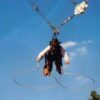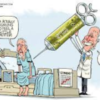Drunk and Asleep on the Job: Air Traffic Controllers Pushed to the Brink
![]()
Drunk and Asleep on the Job: Air Traffic Controllers Pushed to the Brink
in News

6.8k
SHARES
19.4k
VIEWS
Share on FacebookShare on Twitter
One air traffic controller went into work drunk this summer and joked about “making big money buzzed.” Another routinely smoked marijuana during breaks. A third employee threatened violence and then “aggressively pushed” a colleague who was directing airplanes.
The incidents were extreme examples, but they fit into a pattern that reveals glaring vulnerabilities in one of the most important protective layers of the nation’s vaunted aviation safety system.
javascript:window[“$iceContent”]
In the past two years, air traffic controllers and others have submitted hundreds of complaints to a Federal Aviation Administration hotline describing issues like dangerous staffing shortages, mental health problems and deteriorating buildings, some infested by bugs and black mold.
There were at least seven reports of controllers sleeping when they were on duty and five about employees working while under the influence of alcohol or drugs. The New York Times obtained summaries of the complaints through an open-records request.
Air traffic controllers, who spend hours a day glued to monitors or scanning the skies with the lives of thousands of passengers at stake, are a last line of defense against crashes. The job comes with high stakes and intense pressure, even in the best of conditions.
Yet the conditions for many controllers are far from ideal. A nationwide staffing shortage — caused by years of employee turnover and tight budgets, among other factors — has forced many controllers to work six-day weeks and 10-hour days.
The result is a fatigued, distracted and demoralized work force that is increasingly prone to making mistakes, according to a Times investigation. The findings are based on interviews with more than 70 current and former air traffic controllers, pilots and federal officials, as well as thousands of pages of federal safety reports and internal F.A.A. records that The Times obtained.
While the U.S. airspace is remarkably safe, potentially dangerous close calls have been happening, on average, multiple times a week this year, The Times reported in August. Some controllers say they fear that a deadly crash is inevitable.
In the fiscal year that ended Sept. 30, there were 503 air traffic control lapses that the F.A.A. preliminarily categorized as “significant,” 65 percent more than in the prior year, according to internal agency reports reviewed by The Times. During that period, air traffic increased about 4 percent.
A database of aviation safety issues is peppered with recent mistakes by exhausted controllers. A controller at the air traffic control center in the Jacksonville, Fla., area instructed one airliner to turn into the path of another, later blaming being overworked and fatigued. A controller at a facility that monitors the skies above Southern California told a plane to fly too low, attributing the lapse to being “extremely tired” after working “continuous” overtime.
“If I can make a small mistake like that, I can make a bigger one,” the controller wrote in a submission included in the database, which is maintained by NASA.
Many controllers are aviation enthusiasts who are drawn to the job because it can pay six figures. Some relish the opportunity to earn more by working overtime.
But The Times found that the combination of six-day workweeks and round-the-clock schedules has caused controllers to develop physical and mental health problems. Many avoid seeking professional help because doing so might jeopardize the medical clearances they need to work. Some turn to sleeping pills or alcohol to cope.
Others resign or retire. One was Ashley Smith, a longtime controller in Atlanta who said she had witnessed her overworked colleagues engaging in physical fights and making dangerous errors.
The F.A.A. estimated that more than 1,400 controllers — or about 10 percent of the total work force — would depart this fiscal year.
Neil Burke worked as a controller for more than a decade, including at the facility that directs air traffic in and out of airports in the New York metropolitan area. It is widely regarded as one of the country’s most complex control rooms. For years, controllers there have worked six days a week and

































![Lieutenant-Colonel Robert Rogers (7 November 1731 – 18 May 1795) was a British Army officer and frontiersman. Born in Methuen, Massachusetts, he fought in King George’s War, the French and Indian War and the American Revolutionary War. During the French and Indian War, Rogers raised and commanded Rogers’ Rangers, a ranger unit trained for carrying out asymmetric warfare.[2][3](https://www.cowboyron.com/wp-content/uploads/2022/05/1262463_580743685323360_2133853937_o1-1-150x150.jpg)
















![Billie Joe Armstrong & Norah Jones – Silver Haired Daddy Of Mine [Music Video]](https://www.cowboyron.com/wp-content/uploads/2022/11/Al_St._John1-100x100.jpg)























